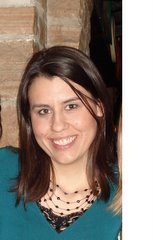 We’ve officially moved into our home in the village! There is still a lot of work that needs to be done, but it is now livable! This is a picture taken from our 'kitchen' window! Our first two weeks of village life have been very eventful and quite exciting! I should start by giving a short description of the village I will be spending the next 6 months inhabiting. Usolonga, also known as Mbolimboli, is a fairly small, remote village situated approximately 70 km north west of Iringa, in the bottom of the rift valley. The last survey conducted recorded a population of approximately 3200 people, 50% of whom were under the age of 15! There is essentially one road into the village and one road out, making it quite isolated. Due to the dry season, the landscape resembles a desert; all you see for miles are little mud huts and lots of sand! The clinic and staff houses are situated on the outskirts of the village, a good ten-minute walk from its centre! The clinic is open each weekday from 8:00am to 2:00pm and local villagers are encouraged to visit on a drop in basis during these times. The doctor and nurse however are technically always on call, and are summoned from their homes if they are needed for an emergency or if there’s a birth. The atmosphere is fairly relaxed and laid back; the staff have been very welcoming and patient as we butcher their native tongue. (Although I must say that our Swahili has improved tremendously since being in the village!) I’m quickly adjusting to “Tanzanian” time, learning that things usually don’t happen when people say they will, being “on time” is an abstract concept that many locals are unfamiliar with and the pace of life is about three times slower than I’m used to, but hey, I’m not complaining! With 40+ degrees temperature, no electricity, and no running water, it is understandable that things usually take longer to accomplish.
We’ve officially moved into our home in the village! There is still a lot of work that needs to be done, but it is now livable! This is a picture taken from our 'kitchen' window! Our first two weeks of village life have been very eventful and quite exciting! I should start by giving a short description of the village I will be spending the next 6 months inhabiting. Usolonga, also known as Mbolimboli, is a fairly small, remote village situated approximately 70 km north west of Iringa, in the bottom of the rift valley. The last survey conducted recorded a population of approximately 3200 people, 50% of whom were under the age of 15! There is essentially one road into the village and one road out, making it quite isolated. Due to the dry season, the landscape resembles a desert; all you see for miles are little mud huts and lots of sand! The clinic and staff houses are situated on the outskirts of the village, a good ten-minute walk from its centre! The clinic is open each weekday from 8:00am to 2:00pm and local villagers are encouraged to visit on a drop in basis during these times. The doctor and nurse however are technically always on call, and are summoned from their homes if they are needed for an emergency or if there’s a birth. The atmosphere is fairly relaxed and laid back; the staff have been very welcoming and patient as we butcher their native tongue. (Although I must say that our Swahili has improved tremendously since being in the village!) I’m quickly adjusting to “Tanzanian” time, learning that things usually don’t happen when people say they will, being “on time” is an abstract concept that many locals are unfamiliar with and the pace of life is about three times slower than I’m used to, but hey, I’m not complaining! With 40+ degrees temperature, no electricity, and no running water, it is understandable that things usually take longer to accomplish.Our first two weeks were primarily spent cleaning, painting, getting to know the staff and practicing our newly learned Swahili! In the mornings we took turns shadowing the nurse and doctor in order to gain a better understanding of their daily routine, the common ailments that present themselves and to make ourselves known to some of the local villagers. We’ve met with the headmaster at the local primary school and have scheduled an introduction session with the various classes for later on this week. We’ll also be conducting an informal survey in each class in hopes of determining their level of health care awareness. Seeing as the students have a month off for Christmas, we won’t actually start teaching until January. In the meantime, we’ll be creating lesson plans and making changes to the previous curriculum in order to prepare ourselves for January. When we’re not at the school (we have yet to determine our teaching schedule –it’ll depend on how comfortable we are in the classroom and how much time we want to devote to other projects) we’ll be working at the clinic and with the local health representatives. Our goal is to come up with some easy-to-use teaching material and train the health reps so that they in turn will be able to teach the locals when we are gone. There is definitely no shortage of work to be done! Jen hopes to start a home garden, as part of her nutrition work and we also hope to introduce some new water purification techniques. Unfortunately, given the lack of resources and next to nil education they have on the subject, it is not as easy as one would initially think. There are many underlying issues and challenges to work through –but we are hopeful!

No comments:
Post a Comment